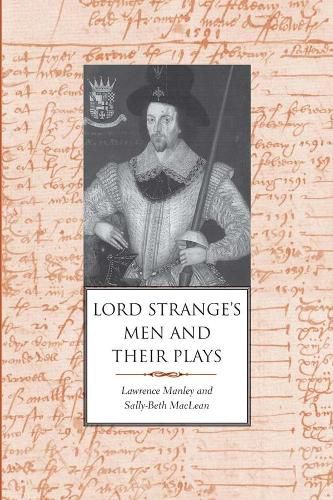Readings Newsletter
Become a Readings Member to make your shopping experience even easier.
Sign in or sign up for free!
You’re not far away from qualifying for FREE standard shipping within Australia
You’ve qualified for FREE standard shipping within Australia
The cart is loading…






For a brief period in the late Elizabethan Era an innovative company of players dominated the London stage. A fellowship of dedicated thespians, Lord Strange’s Men established their reputation by concentrating on modern matter performed in a spectacular style, exploring new modes of impersonation, and deliberately courting controversy. Supported by their equally controversial patron, theater connoisseur and potential claimant to the English throne Ferdinando Stanley, the company included Edward Alleyn, considered the greatest actor of the age, as well as George Bryan, Thomas Pope, Augustine Phillips, William Kemp, and John Hemings, who later joined William Shakespeare and Richard Burbage in the Lord Chamberlain’s Men. Though their theatrical reign was relatively short lived, Lord Strange’s Men helped to define the dramaturgy of the period, performing the plays of Shakespeare, Christopher Marlowe, Thomas Kyd, and others with their own distinctive flourish.
Lawrence Manley and Sally-Beth MacLean offer the first complete account of the troupe and its enormous influence on Elizabethan theater. Seamlessly blending theater history and literary criticism, the authors paint a lively portrait of a unique community of performing artists, their intellectual ambitions and theatrical innovations, their business practices, and their fearless engagements with the politics and religion of their time.
$9.00 standard shipping within Australia
FREE standard shipping within Australia for orders over $100.00
Express & International shipping calculated at checkout
For a brief period in the late Elizabethan Era an innovative company of players dominated the London stage. A fellowship of dedicated thespians, Lord Strange’s Men established their reputation by concentrating on modern matter performed in a spectacular style, exploring new modes of impersonation, and deliberately courting controversy. Supported by their equally controversial patron, theater connoisseur and potential claimant to the English throne Ferdinando Stanley, the company included Edward Alleyn, considered the greatest actor of the age, as well as George Bryan, Thomas Pope, Augustine Phillips, William Kemp, and John Hemings, who later joined William Shakespeare and Richard Burbage in the Lord Chamberlain’s Men. Though their theatrical reign was relatively short lived, Lord Strange’s Men helped to define the dramaturgy of the period, performing the plays of Shakespeare, Christopher Marlowe, Thomas Kyd, and others with their own distinctive flourish.
Lawrence Manley and Sally-Beth MacLean offer the first complete account of the troupe and its enormous influence on Elizabethan theater. Seamlessly blending theater history and literary criticism, the authors paint a lively portrait of a unique community of performing artists, their intellectual ambitions and theatrical innovations, their business practices, and their fearless engagements with the politics and religion of their time.